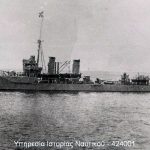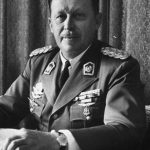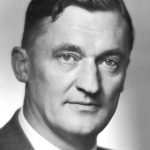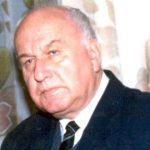 1940 – An Italian submarine torpedoes and sinks the Greek cruiser Elli in the port of Tinos during peacetime, marking the most serious Italian provocation before the outbreak of the Italo-Greek War in October. 10 of its officers and sailors were killed and 24 wounded. After the war, Italy compensated Greece for this act.
1940 – An Italian submarine torpedoes and sinks the Greek cruiser Elli in the port of Tinos during peacetime, marking the most serious Italian provocation before the outbreak of the Italo-Greek War in October. 10 of its officers and sailors were killed and 24 wounded. After the war, Italy compensated Greece for this act.
 1954 – Alfredo Stroessner begins his dictatorship in Paraguay. He rose to the position of President after leading an army coup in 1954. His 35-year rule, marked by an uninterrupted period of oppression in his country, is the longest in the modern history of the South American continent. .
1954 – Alfredo Stroessner begins his dictatorship in Paraguay. He rose to the position of President after leading an army coup in 1954. His 35-year rule, marked by an uninterrupted period of oppression in his country, is the longest in the modern history of the South American continent. .
 1962 – James Joseph Dresnok flees to North Korea after running through the Korean Demilitarized Zone. After escaping, Dresnok worked as an actor in propaganda films, some directed by Kim Jong-il, and as an English teacher in Pyongyang. He would be among the few Americans in the communist country. James Joseph Dresnok, died in 2016.
1962 – James Joseph Dresnok flees to North Korea after running through the Korean Demilitarized Zone. After escaping, Dresnok worked as an actor in propaganda films, some directed by Kim Jong-il, and as an English teacher in Pyongyang. He would be among the few Americans in the communist country. James Joseph Dresnok, died in 2016.
 1982 – Hugo Theorell dies at the age of 79. Theorell, was a Swedish scientist and Nobel laureate in medicine. Theorell, who devoted his entire career to enzyme research, received the Nobel Prize in Physiology or Medicine in 1955 for the discovery of oxidoreductase enzymes and their effects on sodium fluoride.
1982 – Hugo Theorell dies at the age of 79. Theorell, was a Swedish scientist and Nobel laureate in medicine. Theorell, who devoted his entire career to enzyme research, received the Nobel Prize in Physiology or Medicine in 1955 for the discovery of oxidoreductase enzymes and their effects on sodium fluoride.
 1990 – Born in Kentucky, Jennifer Lawrence. Lawrence, is an American actress. The films in which she has acted have amassed over $ 6 billion worldwide, and she was the highest paid actress in the world in 2015 and 2016. Lawrence appeared in the 100 most influential people on the world list in 2013 and on the list of Forbes Celebrity 100 in 2014 and 2016.
1990 – Born in Kentucky, Jennifer Lawrence. Lawrence, is an American actress. The films in which she has acted have amassed over $ 6 billion worldwide, and she was the highest paid actress in the world in 2015 and 2016. Lawrence appeared in the 100 most influential people on the world list in 2013 and on the list of Forbes Celebrity 100 in 2014 and 2016.
 1997– Çesk Zadeja dies, he was an Albanian composer. After the liberation of the country, in the years 1946-1947 he worked at Radio Shkodra as the head of the music department, and after two years he served in the then army until 1951. In the years 1949-1951 he performed military service as a conductor in the Artistic Ensemble of the Army. Cesk is sent to Moscow to study music, to the composition department at the Peter Ilyich Tchaikovsky Conservatory in Moscow, to the class of professors and composers M.I. Cukalli, Bogatyrieff and Tchullaki. After completing his studies, he returned to Albania as a distinguished student and in the years 1957-1962 he was appointed and worked as artistic director in the State Ensemble of Folk Songs and Dances of Tirana, which had just been formed, and where Çesk Zadeja held an intense activity. as creator and organizer of the already poor musical life. He is one of the founders of many musical institutions, as well as their director, such as: Conservatory (today the Academy of Arts) where he works as a lecturer for three years-1962-1965, and then is appointed as artistic director at the Opera and Ballet Theater until 1966. In the years 1966-1972 he was the head of the music department at the Higher Institute of Arts (Academy of Arts) and in 1972 he was a composer in the free profession. Again artistic director at the Opera and Ballet Theater in the years 1973-1979, and in 1979 he left the free profession, creating as such until 1990, to return in 1993-1994 lecturer at the Academy of Arts , where he gives composition and musicology. The influence of Zade’s creativity was great on a number of other creators who followed the path of this creator, because Zade’s activity in the field of composition in its entirety has been dominant, superior and guiding for the generations, which he has learned as a lecturer. at the Academy of Arts of Tirana. The frequent visits of our composers and vice versa brought us a lot of information about the musical creativity, not only of Zade, but also of many other creators, about whom we had never even heard.
1997– Çesk Zadeja dies, he was an Albanian composer. After the liberation of the country, in the years 1946-1947 he worked at Radio Shkodra as the head of the music department, and after two years he served in the then army until 1951. In the years 1949-1951 he performed military service as a conductor in the Artistic Ensemble of the Army. Cesk is sent to Moscow to study music, to the composition department at the Peter Ilyich Tchaikovsky Conservatory in Moscow, to the class of professors and composers M.I. Cukalli, Bogatyrieff and Tchullaki. After completing his studies, he returned to Albania as a distinguished student and in the years 1957-1962 he was appointed and worked as artistic director in the State Ensemble of Folk Songs and Dances of Tirana, which had just been formed, and where Çesk Zadeja held an intense activity. as creator and organizer of the already poor musical life. He is one of the founders of many musical institutions, as well as their director, such as: Conservatory (today the Academy of Arts) where he works as a lecturer for three years-1962-1965, and then is appointed as artistic director at the Opera and Ballet Theater until 1966. In the years 1966-1972 he was the head of the music department at the Higher Institute of Arts (Academy of Arts) and in 1972 he was a composer in the free profession. Again artistic director at the Opera and Ballet Theater in the years 1973-1979, and in 1979 he left the free profession, creating as such until 1990, to return in 1993-1994 lecturer at the Academy of Arts , where he gives composition and musicology. The influence of Zade’s creativity was great on a number of other creators who followed the path of this creator, because Zade’s activity in the field of composition in its entirety has been dominant, superior and guiding for the generations, which he has learned as a lecturer. at the Academy of Arts of Tirana. The frequent visits of our composers and vice versa brought us a lot of information about the musical creativity, not only of Zade, but also of many other creators, about whom we had never even heard.
 2005 – The Helsinki Accords between the Aceh Movement and the Government of Indonesia are signed, ending nearly three decades of fighting. The Aceh uprising, officially designated Aceh’s concern, was a conflict fought by the Aceh Movement between 1976 and 2005, with the aim of making the Aceh province independent of Indonesia.
2005 – The Helsinki Accords between the Aceh Movement and the Government of Indonesia are signed, ending nearly three decades of fighting. The Aceh uprising, officially designated Aceh’s concern, was a conflict fought by the Aceh Movement between 1976 and 2005, with the aim of making the Aceh province independent of Indonesia.
 2012 – Arbën Xhaferi passes away, From 1975 to 1990 he worked at Prishtina Television as a responsible editor and commentator of the culture program. He was one of the first to be expelled from television by the Milosevic regime in the mid-1990s. After this period, he worked as an analyst in the weekly “Koha” with editor Veton Surroin, in “Forum” led by Adem Demaçi and in several other Albanian media, including many prestigious newspapers in the world. The year 1993 will come when Arben Xhaferi will return to his homeland, no longer as an analyst, but as a politician. In 1994 he was elected party chairman. The PDP led by Xhaferi managed to win the 1998 parliamentary elections. It came to power with a completely new strategy. Xhaferi is known as the builder of the platform for consensual democracy, as a precondition for preventing marginalizing tendencies applied at that time towards Albanians, but also as a tool that could be effective against the territorial divisions that threaten Macedonia today. In that grim pre-election period, various analysts had estimated that Albanians would be involved in an inevitable conflict within them. In opposition, Xhaferi from the beginning gave signals that the new government is deviating from the provisions of the Ohrid agreement. He even publicly addressed a letter to President Boris Trajkovski, refusing to participate in talks with him.
2012 – Arbën Xhaferi passes away, From 1975 to 1990 he worked at Prishtina Television as a responsible editor and commentator of the culture program. He was one of the first to be expelled from television by the Milosevic regime in the mid-1990s. After this period, he worked as an analyst in the weekly “Koha” with editor Veton Surroin, in “Forum” led by Adem Demaçi and in several other Albanian media, including many prestigious newspapers in the world. The year 1993 will come when Arben Xhaferi will return to his homeland, no longer as an analyst, but as a politician. In 1994 he was elected party chairman. The PDP led by Xhaferi managed to win the 1998 parliamentary elections. It came to power with a completely new strategy. Xhaferi is known as the builder of the platform for consensual democracy, as a precondition for preventing marginalizing tendencies applied at that time towards Albanians, but also as a tool that could be effective against the territorial divisions that threaten Macedonia today. In that grim pre-election period, various analysts had estimated that Albanians would be involved in an inevitable conflict within them. In opposition, Xhaferi from the beginning gave signals that the new government is deviating from the provisions of the Ohrid agreement. He even publicly addressed a letter to President Boris Trajkovski, refusing to participate in talks with him.






